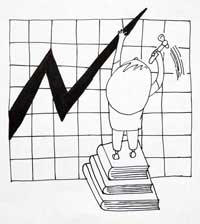
UJC provincial
assembly in Las Tunas
The role of the young communists
in the economic battle
The UJC must explain to
the young people what the Revolution
has done for them and what the Revolution expects of them
By: Juan Morales Agüero
Email:
digital@jrebelde.cip.cu
November 28, 2007 00:00:16
GMT
A CubaNews translation by Ana Portela. Edited by Walter Lippmann. Original:
http://www.juventudrebelde.cu/cuba/2007-11-28/el-papel-de-la-juventud-comunista-en-la-batalla-economica-/
![]()
 Las
Tunas.— Among the subjects debated in the plenary session of the Young
Communist League assembly in this province, the economic battle and its
implication in the daily life of the militancy – a task of utmost importance
that demands maximum priority of the organization – was one of the most
recurring.
Las
Tunas.— Among the subjects debated in the plenary session of the Young
Communist League assembly in this province, the economic battle and its
implication in the daily life of the militancy – a task of utmost importance
that demands maximum priority of the organization – was one of the most
recurring.
It is not simply producing consumer goods or offering services of excellence. I observed this with the intervention of Rolando Varela, delegate of the Vladimir I. Lenin University. Among other subjects he touched upon he said: “We prepare and offer human resources in eight specialties. That is part of our economic battle. We are already waging it”.
However, he admitted that the intention tends to clash with obstacles, such as convincing and requesting commitment of recent graduates to work and spread their competence in places where there are more problems and where they can be more useful. The situation is heightened in the base committee during the concluding years of study when it comes time for job placements because some reject them if they do not correspond to their expectations.
Miriam Yanet Martín, president of the Jose Martí Organization of Pioneers and member of the National Bureau of the UJC assured that the subject must be closely followed by the UJC. “When a student enters university he must be told what he owes the Revolution and what the Revolution expects of him. Consequently, the first lesson should be political and ideological to set the foundations for an economic education”.
Ismael Cruz, first secretary of the provincial UJC called to form an economic conscience in the university. He added that there is a scarcity of qualified work force in the productive sector where, in fact, there are 47 percent of base organizations of Las Tunas. And he asked: “What must the Youth do in a center of Higher Education?” He suggested clearly identifying which professionals the country needs. He mentioned agronomic engineering, with very few students in the classrooms.
But this purpose, obviously, goes beyond the mere vocation of a student for a career. He pointed out that, above all, combined actions to influence that student must be motivated through access to more up dated references about the specialty, to the work practices done by the company. If the young persons is not attended and valued he cannot be a labor candidate reorienting his academic interests or abandoning the route paved by the books.
The subject of the economic battle went in other directions, also, not less current. Hilder Torres, also a member of the National Bureau of the UJC, asked why base committees do not discuss the plans of production of their companies: “Why don’t those whose main activity is economy analyze the situation in depth? In this manner we will never have a solid economic culture. And referring to theTechnical Youth Brigades: The BTJ do not only exist to organize workshops but also to be concerned about those who do not have the possibility of improving.”
A very interesting experience on economic education was presented by Yanelys Machado of the pre university institute in the municipality of Majibacoa. According to what she expressed, the UJC in her center has placed the vanguard in that direction. Thus, they periodically organize meetings where they explain to the collective how much each school resource costs, how they should be used rationally, the importance of saving.. And they also take advantage of murals, exhibits and talks. The initiative has had excellent results in every manner.
The Las Tunas assembly ratified Ismael Cruz in his post as first secretary. The assembly was concluded by Jorge Cuevas Ramos, member of the Central Committee of the Party and first secretary of the organization in the province. He said that in these times “the youth should also be a protagonist in the battle to produce more and be a permanent standard bearer for an increase of production”.

Asamblea provincial de la UJC en Las Tunas